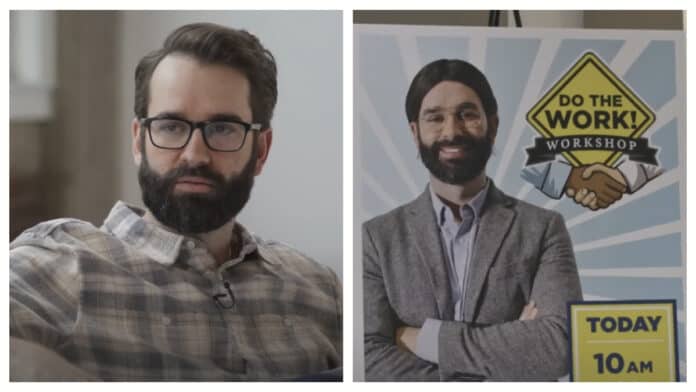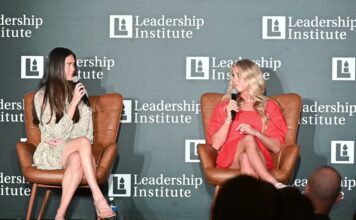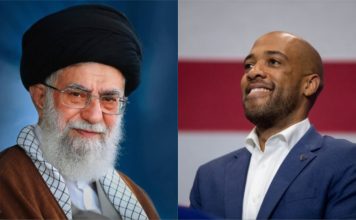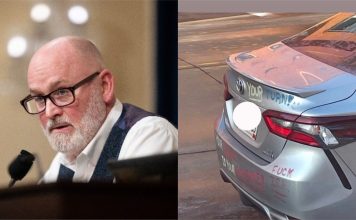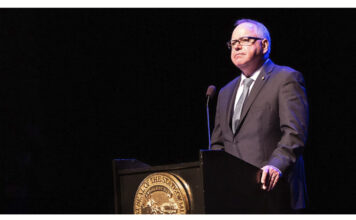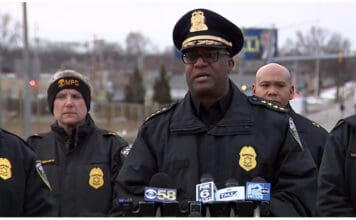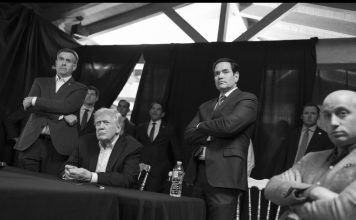This is a movie review.
Matt Walsh’s new Daily Wire mockumentary, “Am I a Racist?” is a hilarious send-up of race grifters and identity politics. Wisconsin Right Now saw the movie in a theater in Waukesha County, Wisconsin, where the audience repeatedly laughed out loud. The level of audience engagement was unusual.
The nation’s elite film critics are outright refusing to review Walsh’s movie at their own peril. This is arrogant, out-of-touch, and yet another sign that liberal politics is killing film criticism in this country. The critics increasingly make half of America think they’re looking down at us. Why would we listen to what they say? We also reviewed Walsh’s earlier documentary, “What Is a Woman?” and the new Reagan movie, which elite critics either shunned or trashed. We liked both movies.
As with his first documentary, Walsh makes a deeper societal point beneath the comedy. DEI has become a big industry, and its product is the country’s past grief and pain. Admitting that society has advanced and that people of all colors have a fighting chance at the American dream today is essentially killing the cash cow.
Thus, the DEI industrial complex has a vested interest in not solving the very problem it claims is the reason for its existence. That makes it a negative force in American society, an industry predicated on the idea that America is endemically bad and inherently unfixable. This negative view of America is dangerous because it’s training a generation of schoolchildren into thinking their skin color means there’s no way they can ever get ahead. It’s based on faulty arguments – no, there is no epidemic of unjustified “police violence” in this country. Those arguments lead to failed policies, such as defunding police departments, not prosecuting serious crimes, or legalizing hard drugs in American cities, and they ultimately hurt people of color the most. Walsh just scraped the surface of this destructive dynamic.
Walsh does not argue that there is no racism in society. Obviously, there is some racism in society, and obviously people of different races were treated very wrong in the past (slavery and Jim Crow were obviously awful). No one is arguing otherwise. What he’s arguing is that the modern DEI industrial complex is a big business fueled by mercenaries, like so-called “poverty pimps” of old, who have a vested interest in it not going away. He believes that race profiteers – many of them white, liberal, affluent women – magnify the degree of racism that exists in American society by finding it in the most innocuous of interactions.
Dressing up as a man-bun, skinny-jean-wearing empath, Walsh exposes how DEI is the domain of an out-of-touch, high-brow, liberal intellectual elite who speak in word salads that would make Kamala Harris proud. In contrast, the regular folks he speaks with, including people of color, aren’t sitting around dwelling on race and have an inherent belief in America’s unlimited potential.
It’s hard not to see Walsh’s film as a proxy for the presidential election. On the one hand, you have Harris babbling about nothing to Oprah, and in the other corner stands Donald Trump, who speaks in the off-the-cuff, blunt, but ultimately authentic language of the working class, with all its salty common sense. They don’t see race; it’s the female “DEI experts” who are the ones obsessed with it. Trump is the guy in Walsh’s biker bar, cutting through the crap. Harris is the DEI expert writing nonsense on an erase board.
It’s not only the DEI industry. Walsh demonstrates how the corporate media, at least at the elite levels, have become a leading purveyor in fomenting American racial division, sometimes by pushing falsehoods or just not pushing back at all (the saccharine morning TV hosts who pretend that he’s somehow making sense were hilarious and frightening at the same time). Conflict sells.
Follow the money.
No wonder the elite film critics won’t review this movie. They’re part of the same snobby elites who control American culture, which is increasingly disconnected from regular folks, who spend their time worrying about their grocery bills and their families, not intersectionality and marginalization.
The movie wasn’t perfect. At his very best, a taciturn Walsh goes toe-to-toe with unwitting liberal interview subjects, dismantling their facile logic question-by-pointed-question. This was the genius of “What Is a Woman?” his previous documentary skewering gender politics. Walsh’s targets really couldn’t answer the central question, and in the end, they were exposed.
We love that conservatives are taking humor back. For so many years, they allowed the left to paint them as sour, SNL-style church ladies. Over the past decade, it’s liberal elites who suddenly became the humorless scolds. In a climate where micro triggers and a smile offend, liberals have killed comedy. They don’t dare offend anyone, and the best humor smashes sacred cows. Younger generations love humor. It’s a great way to reach them.
This movie was funniest when Walsh got out of the way of his work. The insanity of needing a safe room to cry at a DEI support group, a top “White Fragility” author agreeing to pay a black producer $30 reparations on the spot, and the bizarre suggestion that it’s racist to even smile at a black person in a store, were the sort of comic absurdities that we’ve come to love Walsh for.
People’s own words exposed them most.
Some of it was a little scary. “You can not separate yourself from the bad white people,” a woman railed at a DEI dinner that Walsh crashed, saying, “Republicans are Nazis.” Far too many people were willing sheep, signing Walsh’s petition to change the Washington Monument black and name it after George Floyd. Some people he recruited off Craig’s List to attend a DEI seminar were way too willing to shout expletives at his disabled uncle, wheeled forward to be held to account for a racist joke he told at the dinner table.
Walsh is best when he twists people’s logic on them. When he pointed out the inherent contradictions over his daughter’s love of Moana, he hit the target. Was it cultural appropriation for her to dress like Moana for Halloween but racist if she decided to go as a white Disney princess instead? If he didn’t smile at a black person in the hall, would that be painted as racist too?
Where the movie missed its mark was when Walsh got in the way of his film. When he kept repeatedly interrupting the DEI support group facilitator, he started to seem like the crazy guy in the room. He should have just let them talk. As with Kamala finally granting an interview, their own words expose them. Stay out of the way.
Similarly, when he crashed a DEI dinner dressed as a waiter, repeatedly breaking dishes, it turned the movie into a silly Borat-style skit. Since it was a “women-only” dinner, he should have dressed as a woman, and, if he didn’t pass as one, insisted he had every right to “identify” as a woman if he wanted. That would have brought his two movies’ themes together.
Why pretend to be a crazy DEI person when there are so many real ones to choose from?
We also wish he had expanded his targets from the paid DEI experts who write books and hold seminars (for a profit!) to include government (and its rewriting of language); corporate America (airlines, beer manufacturers) who have embraced absurdities; Hollywood itself (every film has to have a non-binary BIPOC character now regardless of plot); as well as academia. This stuff isn’t just existing in some Manhattan salon. It’s taking over our universities and our government, and they’re teaching it to your kids.
Overall, we rate this movie certifiably fresh and give it 4 out of 5 stars.


